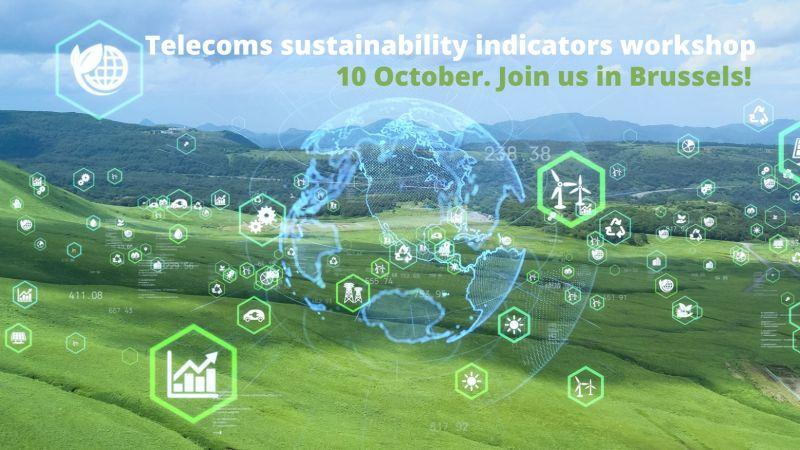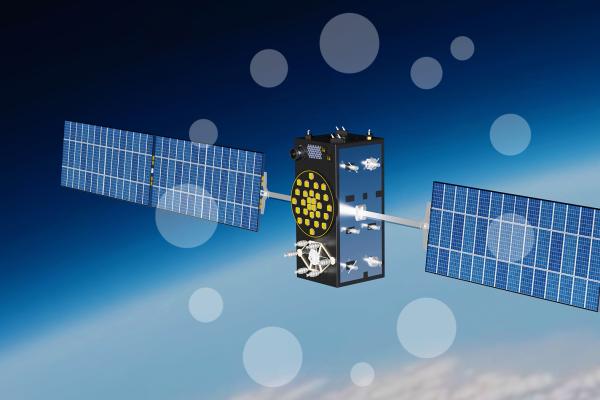- Contributes to EC priorities:
Background
This stakeholder workshop on sustainability indicators was a milestone in the study currently done by DG CNECT and DG JRC to identify the most suitable indicators for telecommunication networks.
The workshop aimed at collecting input and feedback from the stakeholders in the telecommunication sector on a number of questions including:
- Which should be considered the most relevant sustainability indicators for reporting?
- What are the main challenges for stakeholders for the implementation of these indicators?
- How could the work by auditors be supported?
The workshop also had the objective of providing a perspective on the various parallel studies conducted by stakeholders or stakeholder associations (e.g., BEREC, GSMA), which would be useful for the Commission to move towards a Code of Conduct for the telecommunications sector by 2025.
The study builds on the results of an EU survey conducted by DG JRC from 26 May to 23 June 2023 where similar feedback was collected. The results of the survey were presented in this workshop.
Goals
The workshop had the goal to:
-
Identify the key sustainability indicators for telecommunication networks and/or consolidate the recommendations from the survey and the report on priority indicators.
-
Collect input and feedback from the main stakeholders, who were present at the workshop on how to go forward on a Code of Conduct for telecommunications networks in the 2025 timeframe, which can be complementary to the already published Codes of Conduct (mostly coordinated by the JRC) for data centres and broadband equipment.
-
Identify key standardisation or metric gaps, which can hamper the work by auditors or telecom operators to report on sustainability indicators in the future.
-
Identify ongoing activities in this area and parallel regulatory actions to create synergies and avoid overlaps.
Key findings
- There was a general agreement on the indicators with the highest priority identified in the survey (‘must have’ indicators) with the exception of the indicator related to the raw materials, which was also suggested as important by some stakeholders during the workshop. On the other side, telecom operators and vendors stressed the importance of focusing on few indicators because the data collection, analysis and reporting for even few indicators can be a significant effort for telecom operators, in particular for small and medium sized ones.
-
Life cycle assessment (LCA) was mentioned as an important methodology for evaluating the sustainability impact in the different phases of the network and the equipment. The JRC will build on its existing work in this area. The JRC report on “Best Environmental Management Practice in the Telecommunications and ICT Services sector”could also be used for this purpose.
-
For auditing purposes, it was considered important to set a harmonised conceptual framework, which can facilitate the analysis by auditors. In addition, it was noted that it is quite difficult to compare networks from different Member States and it would be more effective to evaluate the sustainability indicators for the same networks over time as the network evolves.
-
There were some aspects related to the renewable energy indicator, which should be analysed more in detail because there is the risk to create imbalances among stakeholders (e.g., regarding access to renewable energies).
-
Smaller operators may have difficulties to gather data on some ‘must have’ indicators that large operators are able to gather (e.g., scope 3 emissions and recyclable products, where there are still standardisation gaps). It would be important to avoid a market imbalance for the data collection and analysis of sustainability indicators, which may penalise smaller companies in comparison to larger ones.
-
Role of legacy infrastructure and how it is accounted for (e.g., trade-offs between higher energy use vs. longer lifetime, which would be better for the environment).
-
There were a number of initiatives mentioned that could support the way forward, such as the Science-based targets initiative (SBI) and the Carbon Disclosure Project (CDP).
-
In the design and drafting of the Code of Conduct (CoC), it would be useful to describe the responsibility of all the stakeholders involved in the processes for sustainability data collection, analysis and reporting.
-
Some stakeholders underlined the need to work on quantifying the enabling effect of telecoms on other sectors (not in scope of this study but done by the European Green Digital Coalition).
-
Feedback from past activities on existing CoCs. For example, the wording and terms of the Data Centre CoC had to be completely changed by auditors to make it auditable, in particular for the pass/fail criteria.
The next steps by DG CNECT/DG JRC for the study were identified as follows:
-
DG CNECT/JRC will draft a report of this workshop based on the collected notes and recordings, to be included in the study.
-
DG CNECT/JRC will finalise the study so that it can be published in beginning of 2024.
-
The material of the workshop (presentations, recordings) will be made public.
Agenda
The agenda of the workshop is presented below. The key elements of the workshop were the presentations by DG CNECT, DG JRC, BEREC (which is conducting a similar study on sustainability indicators on telecommunication networks) and the two panel sessions: the first one with telecom operators and vendors and the second one with government representatives and auditors.
- 09:00-09:05Welcome remarks
DG CNECT Coordinator
- 09:05-9:15Setting up the context for the identification of sustainability indicators for the provision of electronic communications services (ECSs)
Johannes THEISS, Team Lead - Policy Coordination, Future Connectivity Systems, DG CNECT
- 09:15-09:40Detailed presentation of the study findings
DG JRC
- 09:40-10:00Q&A on the study findings.
Participants
- 10:00-10:30Break
- 10:30-11:50First Panel Session (moderated by DG JRC)
Panel session with the perspective from operators and vendors. Panellists:
Daniel Alberto Maniega (Telefonica-GSMA)
Sølvberg Tina Hageberg (Telenor)
Azeddine Gati (Orange)
Mats Pellbäck Scharp (Ericsson)
Pinar Serdengecti (ECTA)
- 11:50-13:30Lunch break
- 13:30-13:45Presentation on the ongoing work on sustainability indicators
Presentation by BEREC representative Sandrine Elmi Hersi
- 13:45-14:00Q&A on presentation by BEREC
Participants
- 14:00-15:20Second Panel Session (moderated by DG CNECT)
Panel session on the perspective from national authorities and stakeholders beyond telecoms. Panellists:
Lois Ponce (ARCEP)
Julia Meyer (ADEME)
Martin Michelot (TIC-COUNCIL)
Gillo Malpart (Mavana)
Bernd Sörries (WIK-Consult)
- 15:20-15:50Interactive debate
Interactive debate among workshop participants on:
How to select the optimal indicators for measuring the sustainability of telecoms networks (also using web interactive tools like slido)
Identifying the potential pitfalls/challenges for the deployment of indicators
Gathering recommendations for the development of a future Code of Conduct
DG CNECT and DG JRC
- 15:50-16:00Closure of the meeting and next steps
DG CNECT and DG JRC
Workshop agenda
Video recording
The link below provides the recording of the workshop on the 10th of October 2023 starting from the first panel session in the morning.
Please contact gianmarco [dot] baldini ec [dot] europa [dot] eu (gianmarco[dot]baldini[at]ec[dot]europa[dot]eu) for the password to download the video
ec [dot] europa [dot] eu (gianmarco[dot]baldini[at]ec[dot]europa[dot]eu) for the password to download the video
Presentations at the stakeholders' workshop


